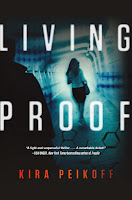This post is subject to my disclosure notes, which you can find here.
I’ m not normally a huge fan of first novels. LIVING PROOF by Kira Peikoff is, however, a huge exception. It is an exceptional story, and one that happens to concern a topic about which I’m passionate. Kira is one of the smartest young people I’ve ever met, and her insight and diligence is admirable. I’ll have a review of LIVING PROOF for you over the next few days, but in the meantime, I asked Kira to share some of the story behind the book.
Enjoy!
When I was 12 years old, I decided that I would become a novelist. By college, this yearning had morphed into a certainty as sure as any fact. I never doubted that I would commit to it one day, but finding the right time was tricky. After all, I needed to graduate from NYU with my journalism degree and establish myself in a real job; writing fiction seemed like a luxury, not a career. Looking back now, it’s sad to see how often growing up squashes childhood dreams, deeming them second-class citizens to practicality and convention.
Luckily the storyteller in me didn’t take the conformist that seriously. I hunted for a good idea anyway so I could get started as soon as possible. Around this time, in June 2006, I moved to Washington, D.C. for a summer reporting internship with The Orange County Register.
On one assignment, I went to the White House to cover President Bush’s first veto—rejecting Congress’s bid to lift federal restrictions on embryonic stem cell research. He spoke like a saint, proclaiming that morality and human decency required his rejection of the bill, as an adoring group of pro-life advocates sat at his feet.
It took all my trained journalistic objectivity to return to my office and write a fair, balanced piece for the newspaper. But when I went home, I was livid. I thought of all the ill and injured people who could potentially be helped by embryonic stem cell research, and how backwards it was for the government’s religious-infused politics to put a stop to it. The way I saw it, the promising field was being thwarted in its infancy (excuse the pun). How much time was being lost, I wondered—and how many lives that might have been saved?
It was deeply personal wishful thinking. When I was 15, my best friend Caroline was diagnosed with acute myeloid leukemia. It was hellish, surreal: visiting the hospital every weekend for months, watching her heave into plastic basins and shed her long blonde hair in chunks. Astonishingly, she joked with the nurses in the ICU and even apologized for causing me sorrow. She died on May 17, 2002 at age seventeen. Almost a decade later, it’s still a sensitive subject. I believe that Caroline’s tragic death laid the groundwork for my fascination with biomedical research—and my fury at its obstruction.
So after Bush’s veto, I started to imagine a character. She was a very sick woman, one who desperately needed this research to save her life. But what if she lived in a society that had gone just one step further than our own, taking conservative views to their logical conclusion by declaring the destruction of any embryos illegal? How far would she go to get around this law if she was courageous and desperate enough? And what would happen if someone in the government started to suspect her—then simultaneously fall in love with her?
I was hooked. I wanted to know more about this courageous woman and the world she lived in. I wanted to demonstrate the life-or-death stakes for each of us today regarding stem cell research, and where we could be headed in the near future. I wanted a heroine I could believe in, and a hopeful ending I couldn’t have rendered in real life.
After graduating from college, I dedicated one year full-time to writing LIVING PROOF. After countless revisions and drafts over several more years, I now have a book I am proud to share with the world. I have stayed true to my original vision, and I hope that it entertains and inspires. I also hope it provokes readers to consider how deeply religion in politics today can affect the science and medicine of tomorrow. Our lives depend upon it.




First to comment, lucky me. I had cancer five years ago this March. A few people I have met didn’t make it. I don’t say I beat cancer because it’s an evil son of a bitch and it takes out the brave and strong as well as the weak and sometimes it spares a few of either.
I am waiting to see is a beautiful and kind women age 52 in her fifth round of chemo, (we couldn’t visit today, she is too sick) will make it by a miracle or not. I know that cancer, heart disease, strokes and other forms of illness are caused by pollutants and diet (See “Forks Over Knives” Netflicks) but I also know genetics plays a part. Stem cell research can be done without harming others and could save lives. Those dying with Alzheimer’s could one day be spared such a horrible life. My respect, young lady, for being tough and going after what you want. More people, young and old, should be so focused and show the courage to follow their dreams. s deluca Mendocino CA
Interesting that you find it offensive that the government stick its nose into every business. The embryonic stem cell research was not halted, it was just not funded by the feds. It is interesting that you have an Ayn Rand tag on this book and want the feds to fund things. I agree the research should happen, but at a private level. I have not seen a single thing that the feds do well other than spend money poorly.
I find it almost unbelievable that someone could do even minor background research into this subject for a novel without discovering that the significant advances that have come from stem cell research have come almost exclusively from ADULT stem cell research. Research using EMBRYONIC stem cells has yielded virtually nothing, whereas adult stem cells have been used in quite a number of impressive breakthroughs in medical treatment.